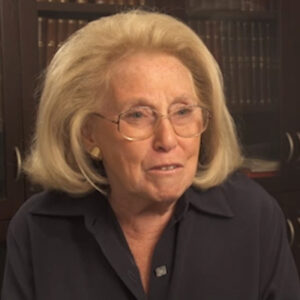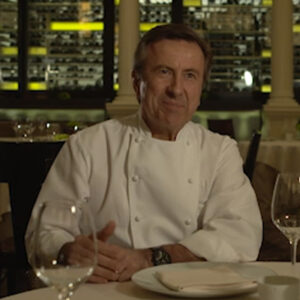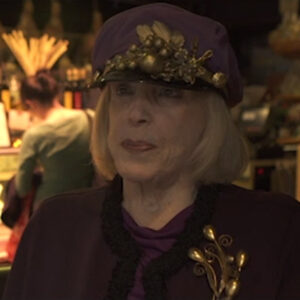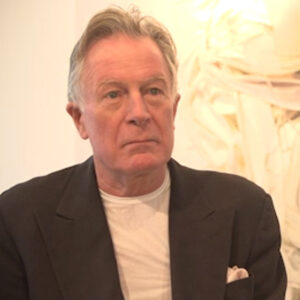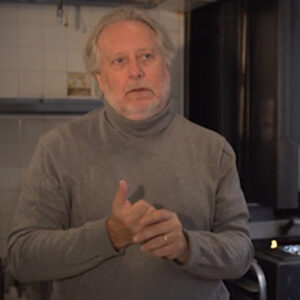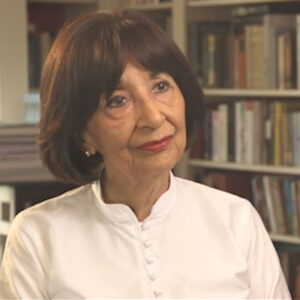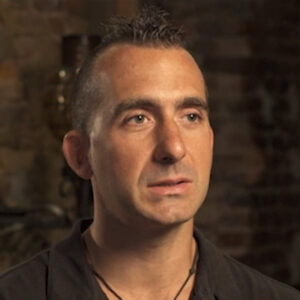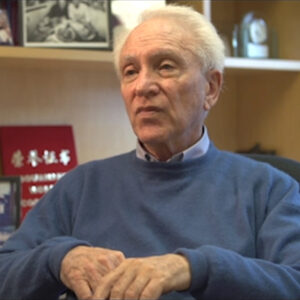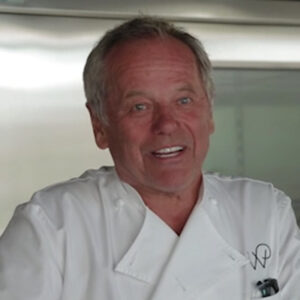Speaker 1 Yeah, when James Spirit started writing, there was no such thing as food media. Well, technically, I guess there was there were there were reviews. Lucious Bebe was a famous critic in Gourmet magazine, but really there was no profession of food writing. Everyone was either a socialite or a gadabout town or something like that. And food. There were even there were even guidebooks to restaurants in New York City from the turn of the century. But none of them had much knowledge of food, really, and certainly no one did it as a profession. And so when Berard arrived, he had no intent of becoming a food writer either when he arrived in New York in the 1930s. But but he set out I think he arrived in New York with a knowledge of food that I think was unique for the people in New York. He came from Portland, Oregon, the turn of the century. His mother had a boarding house. He spent time on the docks in Chinatown. I think that he had been exposed to things that even erudite connoisseurs of food in New York’s restaurants at the time hadn’t ever experienced or probably didn’t even know existed.
Speaker 2 And what role did James Beard have in the evolution of the media in his career?
Speaker 1 So Beard’s role in the evolution of food media during his career I think is really fundamental. And and in some ways, it was due in large part, I think, to the fact that he was a man writing about food for most of the time in the 20th century in America, food writing was for women or restaurant writing to some extent was for men. But recipes and that sort of knowledge of cooking was really women’s work and women’s writing. So so in some ways, I think he was a pioneer in gender. And I think because he was a man and a big man, which I think is is important, he had a sort of authority at the time that made cooking, it’s sad to say, made cooking a little bit more, what’s the word, a little bit more agreeable, accessible for men and for people who were more interested in things than just making dinner. And and so when he started writing about food, which was very early, first he came to New York and he wanted to be an actor. He didn’t succeed, although he did have a few parts on Broadway, apparently. And to support himself, as many actors do today, he worked in the restaurants and actually he opened a catering company with his his friend and colleague called or Dervaes Inc. And his first book came out of that experience called Ordovician Canopy’s. And that was around 1940. And I think that was probably the first cookbook written by a man with an American, a New York approach to food that was about entertaining and about sort of the good life in a way, but a very practical book. This is how you make a canapé. This is how you roll a cookie in a roll, a cracker, I should say. This is how you roll a cracker into a beautiful little or derb. And I think that I’ve used to call them and do that’s the order. And I think that I think that when he the traction that book had and it sort of tapped into this this urbane entertainment food as well as more than just sustenance idea. And I think it was we think it was really a watershed. And then his career progressed. He got more and more into recipes and cooking and the knowledge of food and sort of developing a notion of connoisseurship and and was probably one of the few people in the forties and fifties, certainly the one of the only men to to write about food seriously. And not just, you know, what do we make for dinner, but how, you know, what is important about food, what is there to know about food? How do we approach a recipe with some sense of tradition? I mean, there was nothing like we had today, and I think it was a revelation at the time.
Speaker 2 What do you know about his childhood growing up in Oregon?
Speaker 1 Beard’s childhood in Oregon, I, I would say it was probably unique, although certainly it informed him throughout his life, and I think that its exposure to various things because of its uniqueness is set him apart in his career and certainly up until he died and he was born in Oregon, as I have said, and he was born in Oregon at a time that Oregon was sort of a boomtown town had just come. The the the industry along the coast was was gearing up and his mother ran a boarding house and the boarding house had always distinguished itself, I guess, with food. His mother, Elizabeth. Some people call it Mary, some called Elizabeth. It’s hard to know. I didn’t know him, but she seemed to always emphasize the food around her boarding house table in a way that set them apart. And she had a renowned Chinese cook named Lett who really informed Beard, I think, tremendously. And James spent a lot of time while he was growing up in Oregon’s Chinatown. And that also, I think, is a thread you see throughout his life and his influences, his interest and exposure to Chinese food. But also I think that made him open to sort of the ethnic foods of the world. And today we take for granted, especially here in New York, that that we know about and experience all sorts of different ethnic cuisines. But I don’t think we think that at the turn of the 20th century that that was as prevalent as it was. And probably Beard certainly was had a key role in making that making that true. So as he grew up, I mean, I can only imagine he had a somewhat awkward childhood. I don’t know when he writes about it. You know, he certainly has fond memories, but his father wasn’t very present. He hung out with old guys in Chinatown playing mahjong and sort of eating what I would imagine were exotic foods. He certainly was larger than life at the time. You know, well over six feet a big kid before so many kids were big, unfortunately, as they are today. So I imagine well, and on top of it, he was also gay. And I think that that meant something probably very different. But certainly he had an outsider’s perspective, I imagine. And and I think that that outsider’s perspective kept him gave him a keen awareness throughout his life of what was happening inside and what was outside. And I think that part of his perspective and part of what he contributed to food was a sort of participant observer who wasn’t necessarily in everything, but certainly had this vast knowledge from above, like an omniscient narrator of food.
Speaker 2 In what ways do you feel that he was a real the revolutionary?
Speaker 1 In what ways was Bearder food revolutionary? It’s interesting because when you go back and look at it, it’s hard to know. And again, I wasn’t there at the time. I didn’t get the first book. But but we keep hearing throughout the 20 years I’ve been at the James Beard Foundation, I run into people who knew him or who knew his work more than who knew him. And there are just certain things that clearly tapped into moments of people’s lives and sort of the context around Beard on Bread is probably the most referenced book that he did. And I can only imagine it. It was a revelation to people that you could actually bake bread because people refer to it so often. Same sort of thing with his original cook with the James Beard Cookbook began with the recipe for boiling water. I mean, part of what made him unique, I think, was he really was that accessible. He he believed, I think wholeheartedly that good food was good for everybody. It wasn’t necessarily for you know, for for and I think he believe that good food was for everybody, that it wasn’t really reserved for the upper classes or wealthy people in big cities, that there was actually something to know and appreciate and to get from the enjoyment of good food at every level. And I mean, I’ve heard that he was a bit of a snob, but certainly when you read his stuff, he he really just wanted people to cook and started with how to boil water. I think that really set him apart during his time. Also from the people who are writing about food in Gourmet magazine, in The New York Times and some of the publications which were really not for everybody. I would say even today you see sort of two different tracks. There’s the you know, the magazines and the media that are targeted to home cooks in the middle of the country. And then the the other media that are for everyone else. And I think Beard really did have throughout his life bridge that gap between between dinner in a house in the middle of the country and dinner in a fancy restaurant in a big city on the coast. And I think that’s another piece of his unique proposition.
Speaker 2 About his work as a restaurant consultant said what they did was go down. How was that? So we’re looking at the time.
Speaker 1 Yeah. So Beer consulted on several restaurants and had a very close relationship throughout his throughout Obama’s life and Beard’s career and job, sort of the creator of the form of the 12 Caesars, the Newmaker, the Rainbow Room, the Four Seasons, all of these iconic American restaurants that really ushered in an era of American dining. I think Beard was certainly an inspiration and had an impact on those. The Four Seasons may have been the most famous collaboration, although it should be said that he he worked with Mimi Sheridan, who later became the restaurant critic of The New York Times, on developing that menu with them for the Four Seasons. But but together, it was an idea they set out to make an American restaurant, which I think was a radical idea at the time. Even Obama’s idea that restaurants were theater and that people went there not not just for dinner, but for sort of a show, even whether there was or was not a show. But that was the whole evening’s experience. And entertainment was the food and the servers and the environment, I think a very American approach to restaurants. I think it had a part of that. And so when they opened the Four Seasons or when they worked on the Four Seasons, it opened in nineteen fifty nine. I think they were thinking about how to take some of the more thematic or entertainment ideas that that film had put in other places and maybe smooth them out a little and make them perhaps a little more sophisticated. But certainly to envision some idea of an American restaurant and I’ve written in the past, I actually think that the Four Seasons is really the first American restaurant with a capital A. and a capital R because because it was a restaurant of the time. Nineteen fifty nine in the basement of an iconic skyscraper of a very wealthy company, the Secret Building. And it has the feeling of sort of capitalism and money and wealth and power in a way that I think American dining sort of was shaped by that notion for years, almost decades to come. It wasn’t a little quaint French bistro or even a fancy little French restaurant. It was a restaurant. And I think Biard sort of outsized nature, his understanding of food sort of from the coast, from the garden, from across the country, really helped inform that experience. When you look at the early menus now from when it opened, they seem more French and more more fancy than you would expect in this great American restaurant. But but when you dig down and the ingredients of Shad Roe, where the names of the farms where things came, it was really groundbreaking, an idea restaurant. I mean, it sounds funny now to say a restaurant where the food changed with the seasons was a groundbreaking idea. But but certainly if you were used to going to someplace that always had the same menu, that always served the same 10 or 20 classic dishes, I think they they really changed the game for restaurants that came after it. And I think the fact that it’s still going strong and it’s still such an iconic piece of New York food culture and restaurant culture and society culture speaks to the success they had with it.
Speaker 2 How about how was he influential as a teacher?
Speaker 1 How was Biard influential as a teacher? Well, it’s funny because in some ways it’s almost lost a little bit that James Byrd was a teacher. I think I mean, many people were his students. But but when you look back, you know, he had a small way that he had a small space to teach, you know, maybe a dozen people at the time. I think that they were mostly wives or housewives of of affluent people. It wasn’t cheap. He was in the village, was a little bohemian. I I’m not sure that beer touched as many people as a as a as a teacher. But I think that his teaching really informed his writing and his books touched millions. And and so I obviously I never took a classroom, although I know people who who did. And he said he wasn’t exactly the best teacher in the world. You know, he didn’t really show everything, but he really inspired you to try or to not be afraid. As I said, he really sort of broke down the barriers about cooking in a way he was not afraid to cook or or explore food in any way. And I think that in in American culture, somehow, in between the time that he was born and the time that he was teaching at the height of his career in, say, the 60s in New York City, we became afraid of food or something that somehow so much changed. And we got out of the kitchen and we were sort of proud to not be there. And we lost an association with food. And I think we’re only retrieving that association today. But I certainly think that beard and his sort of everyone can do this approach and everyone can do this. And everyone and also you don’t have to be afraid to not do it. Exactly how it was is done in some other country or some other place. I think that that that approachable teaching quality makes his his work resonate and really had a big impact on a lot of people. They really laid the groundwork for Craig Claiborne and Julia Child and the and the real experts and the sort of sticklers for authenticity who came after him. He sort of knocked down the barriers. And then if people were interested in more and more and more, this whole world opened up of people who had expertise and so many different cuisines around the world who who you could go to once you were once the fire was lit inside, that actually cooking was fun and not drudgery.
Speaker 2 Let’s talk about Julia Child, his relationship with Julia Child and Craig Claiborne’s.
Speaker 1 Sure, Beard and Julia Child became best buddies, we Betty Fussell once wrote an article for us at the James Beard Foundation about these sort of they were both outsized figures. They were both over six feet. They both had sort of funny voices. They both sort of commanded attention in a room. And she she presumed that she knew them both, that they found each other and found comfort in each other, sort of in this outside space. As I mentioned earlier, I think that when Julia Child, who came to cooking late in her life, we sometimes forget that. I often remind my friends who think it’s too late for them to learn how to cook, that she didn’t really start till she was in her late thirties and her book came out in her 40s. And and she you never it’s never too late, basically. But when she wrote co-wrote Mastering the Art of French Cooking and was coming to America, there’s a famous story. Her editor who went around made the rounds for different publishers and ended up with Judith Jones at Knopf and Judith Jones, who knew James Beard very well, asked who she wanted to meet when she came to New York and she said the only person she said she knew was James Beard. And Beard threw a party to introduce her and some back and Louise at Bertold to America, to the people that he knew. And and he was a great connector, always never afraid to introduce someone to someone else who’s sort of you get this image from his phoning and his writing and his just his entertaining that he was a little bit like like, you know, people would ricochet around him, that someone would come in and he’d send them out in another direction. And I think that that with with Julia Child, who also had a generous spirit, I think they sort of helped cultivate a whole food community pretty strongly. His relationship with Craig Claiborne, again, I didn’t know these people, but his relationship with Craig Claiborne, from what I’ve read, was a little bit more strained. I’m not sure on whose side. Certainly. I think from from what I have read and the recipes in the books and the people that I know, Claybon was a little bit less sure that it should all be so approachable, perhaps, or that maybe there should be some distance and an appreciation of expertise. Again, he came sort of a generation later. And so it’s possible that after sort of opening it all up, as beer did to some extent, that Claiborne was trying to distance himself. Obviously, he was the critic of The New York Times, the first very famous critic who also benefited from being a man, I have to say, in a woman’s world, when he started writing about food in restaurants, they were still on what were called the women’s pages at The New York Times. But Clybourn, I think, somehow used erudition to separate himself, the sort of mastery of authenticity. And and Beard took some criticism throughout his life that he was wasn’t as concerned as perhaps he might be in getting everything exactly how it’s done some other place, because, again, he straddled this evolution of food in America, whereas I think Clybourn focused on finding the Brazilian cook or the Ethiopian cook or the Korean cook and trying to recreate things exactly as they were done. Beard was a little bit less concerned with that in his writing in his world. I don’t know personally what their relationship was, but but they also, I think, had tremendous respect for each other. The two of them, along with a child, really created this food frenzy where in 40 years later and I think we owe them all three of them, a tremendous amount of debt.
Speaker 2 Anaphora claims to have escaped this year. How did they
Speaker 1 really know each other? Mean MFK Fisher was is I actually don’t I don’t I don’t know much about what the relationship was. MFK Fisher was a great. I don’t know, MFK Fisher was a great writer, I don’t think there was ever a great writer. In fact, when I read his stuff today. I mean, obviously a lot depended on the editor and his assistants and stuff. It reads more like a blog. I almost feel like he anticipated blogs. His books like Appeared on Food, and even his memoir Delights and Prejudices. They’re chatty. They you know, we for years we we are always looking for quotes from James Beard here at the James Beard Foundation. And and it’s very hard to quote because he didn’t speak in soundbites. He kind of predated sound bites, even though he was the first cook on television in nineteen forty five. He when you read his stuff, you can’t, you can’t separate it out. It’s just sort of a running joke. You kind of feel like you’re on the phone with him. And to me that’s a quality that we have, we expect in blogs today. And and I think that he would have been a tremendous blogger because it would have been up early in the morning cooking and chatting with the entire world. I think that when it came to writing, sure, it was much more craftsman in her writing is she was as much a writer as a food person, probably more so. And and I do think they shared an emotional connection to food, especially in France and certainly to California. Beart never, never lost his West Coast ness, even though he became such an icon of New York Food Society and in Greenwich Village, where the very foundation still sits in his home. But he always understood, I think, profoundly the differences on the West Coast. He had very close friends out there. Helen Evans Brown and Marc Fisher was a close friend, even going to forget her name. Marion Cunningham was was a dear friend. And they they were West Coasters. And I think we sometimes forget it’s very different out there today. Everyone so much closer because of the way that we communicate. But but I think that the that a West Coast mentality also sort of was a certain openness, a nod towards the east and China and Asia in general. And I think that that he certainly had something shared something deeply. Julia Child, in fact, was from the West Coast. Also, I think there are something some something there that he that they all had together. Clybourn was not from there. Maybe that was part of the reason they weren’t best buddies. I’m not sure.
Speaker 2 Tell me about his relationship with Barbara.
Speaker 1 His relationship with my Peacocke was I was very close. She was an assistant, he I heard I’ve heard Barbara tell this funny story where they dumped off this giant machine in the middle of the kitchen at the bird house. And it was one of the first microwaves and they wanted him to do something with it. He was always writing recipe pamphlets for Cuisinarts or things like that. And he didn’t have the time or interest and said, here, why don’t you take it home and figure it out? And she wrote the Microwave Cookbook, which became one of the best selling books of all time. She also worked very closely with Joe Gelbaum. And in that in the connection there in the creation of the Rainbow Room, for instance, and she she talked about how difficult it was to be a woman, a young woman at that time. In fact, in some ways a society woman at that time to command attention. And a professional kitchen, especially in those grand restaurants, was not easy. But I think that they were always supportive of each other. And she’s someone who reminds you of all of the humanness of James Beard often. And she a lot of people, he’s become a memory larger, a memory that’s not just larger than life as he was, but actually better than life. Actually, he was human, as we all are. And Barbara reminds people of that he wasn’t some fantasy. He actually was a person who had demons, as we all have, and and challenges in his life. I think that. You know, she’s completely indebted and she started he started her career, so. So far on this there,
Speaker 2 what are some of the demons that James Stewart struggled to?
Speaker 1 Some of the I mean, I think that James Beard struggled, struggled with many demons, I think his size was always an issue. He always had some some food things. You know, he fluctuated, I think, between probably two hundred and seventy and three hundred and fifty pounds. And ironically, today, people are big in America. And not that it’s easy necessarily, but I think that he would have felt more at home. He was six four also, which was kept him distinct and he was gay at a time when I don’t no one even knew what that meant. I mean, he really transcended the transition of that. And so so I think that I mean, again, I didn’t know him, but I even if I did, I don’t know that I would know what was inside of him. But would you read some of the stuff about him? And you talk to people there? Certainly some there are issues there as there are everywhere. I don’t know anyone who doesn’t have them. I also think that he was always concerned about money and and as many food writers today are, there was not a career and he didn’t come from money the way Julia Child did and could easily say, I’m not going to take a sponsorship or I’m not going to do anything. But he had to be concerned where his next paycheck was coming. And he was living a life in New York with wealthy people in America where money was important. And I think I can’t imagine that doesn’t weigh on him. I think we’ve all been there also. And and I think to some extent, people have criticized him for some of his sponsorships or spokesperson this and then meanwhile, flash forward today. And therefore, there isn’t a chef out there who doesn’t have a line of pot, is it on QVC? So much has changed. So in that way, even though I think that he was pioneering because there is no there is no career in food or there are very few careers in food even I do with this. We we meet with students all the time from different programs who are interested in getting into the food world or interested in writing. And even though there’s a tremendous amount more interest in food and there are great restaurants and chefs and blogs and and things to do in and around the food world, there are there aren’t that many more careers in food. You don’t graduate from a food studies program and and then sort of progress through the next ten years into some position of power. You have to scrape it together. And bearded that I sometimes call him, he’s known colloquially as the dean of American cookery, which The New York Times called him in nineteen fifty seven. Actually, I call him America’s first foodie because I think that he I mean that sort of social nature of what he did, that sharing nature, you know, he so would have taken pictures of what he cooked and put them on Twitter and Facebook. There’s no question in my mind that he would have been on Facebook at 6:00 every morning checking in with everybody. And so I think that he really I mean, foody in a present sense, but he was the first one in past history.
Speaker 2 Tell me about Jena
Speaker 1 much Jena was Jena was beards, long time companion, as we used to say then, and he there isn’t a lot, at least there isn’t a lot in the public record about their relationship. I know that when the Beard Foundation purchased the house and one of the reasons the house wasn’t readily salable after Bill died in 1995 was that she had a lifelong lease on the second floor, I believe, of the Beard House. And in fact, I’ve heard stories that during some of the first events in 86 and 87, he would come down in his bathrobe to let Percy, who was Beard’s pug, pee in the backyard during in fact, I think one auction when one auction that we did there. So I you know, you just you don’t there is not a lot on the record about Beard and his relationship with Gino or even with his with his gay identity. I’m not sure that it’s been kept out of the press as much as it wasn’t a topic that people talked about then and certainly lived long enough to see a time when people did, although he died maybe five, which was a time when AIDS and HIV and sort of that that world was still very scary. And so I’m sure even then it wasn’t it wasn’t a celebration of our uniqueness or whatever, but so. So he didn’t live very long after Bill died, wasn’t in the House very long, but but people knew him and knew him for years. And throughout Beard’s career, his editor for most of his books was John Feron, who helped shape I get the sense it was kind of all over the place. And clearly part of the chattiness of his writing, I think, was he almost dictated as much as he wrote. And so there’s a certain fluidity and and rambling this to some of his writing. I have no doubt, John, for who? To whom Beard left all of the rights to his excellent books, which I think shows their close relationship was key in shaping that and sort of creating the identity of beard in the sort of prayer space, even though he he was just an editor. I forget what house originally, but they worked together throughout most of his career and continued John Brown, who, as I said, had the rights to much of the stuff that Biard wrote and owned the rights to continue to shape work into books after Bill died. And some of my favorite books actually have come after Beatts death, including a book of letters that John Feron wrote, that John Brown edited, that were letters that James Beard wrote to his best friend, Helen Evans Brown, who was a cookbook writer on the West Coast. She wrote the California cookbook, which disappeared, but as a great cookbook, if anyone ever sees it in the US, I mean, if anyone ever season a used bookstore, I recommend you pick it up and talk about the roots of California cuisine. But Beate and Helen Evans Brown had a very close relationship and they wrote almost daily from nineteen fifty to nineteen sixty two when she died. And this book of letters to me is actually the most untouched sort of true voice of James Beard, really talking to someone he respects and loves very closely. Unfortunately, it’s only one way. I guess she didn’t save her letters or they didn’t make it until that book came out. It’s called Love and Kisses and a Halo of Truffles, which is how it used to sign his letters to her. And it’s very touching. And you see from that period of the fifties and right into the early sixties, you just see this transition in food and his understanding of of what food writing is and how people are opening their mind. They’re traveling more. You meet people like his friends call Jerome. He talks about Julia Child. He it’s just a really neat snapshot of the middle of the last century and a transition, I think, in American food that, again, sort of laid the seeds for the frenzy that we’re in now.
Speaker 2 No, I understand that Clay Triplett worked for him since the 50s. Yeah. And tell me about their relationship.
Speaker 1 So Clay Triplette was James Beard’s manservant is the word you see, which sounds so funny. I think Vallet my father was one of the valet and I think Clay was Behrendt’s valet. And he you know, he remember he lived and worked out of his home. And so there were recipes and classes to get ready for. There was writing to happen. There were personal things to deal with today. We’d call him a personal assistant, I think. And Clay came to Beard in the fifties. He was a dancer, I believe, a young dancer, and he stayed with him until he died and then stayed with the James Beard Foundation for twenty five years after that, as our head steward and certainly the keeper of all of the stories and the law. And if anyone saw Beard in his his most intimate moments, it was Clay Triplette. I don’t know if they ever had a relationship besides the. Working relationship, certainly, they were fond of each other, they referred to him as Mr. Beard until the day he died. So I don’t I don’t really know what beyond that. But he was always a fixture in in anyone who knew Beard knew Clay. And subsequently anyone who came and looked at the house knew Clay also because he would welcome them in the morning. That sort of person we think of The Devil Wears Prada or something, where where it’s a job and it’s drudgery and it’s whatever. But I actually get the sense that that beard was more encouraging than that and was a nice person to work around and work for. I’m sure he was scattered and made you do a lot of things that, you know, and and had a hard time focusing. But but no one ever said they hated working for him. No one ever said I’ve never heard it anyway. And certainly to have been with someone for 50 years I think speaks volumes.
Speaker 2 So and Carolyn Stewart, what is her role for Mr. Gordon? She also
Speaker 1 yeah. Caroline Stewart, I think was also also an assistant. More on the business side, although everyone we like today, food is both business and personal, and so it’s hard to separate them. You don’t really go to an office and do food and then it ends at five and you go home. You actually go home and cook dinner. And so there’s there’s always and often entertained, we find even at the beard house. It’s funny at the Jane’s presentation today, you know, sometimes after a long day we go to the big house for dinner and it’s still a work, but also fun and pleasure. And I think that Caroline Stewart was an assistant who helped with typing and writing and calling and organizing in a more traditional, say, personal assistant role. And I imagine she did her fair share of personal stuff, too. But she was part of the little circle. There was always there was always something. There was always a little group at the bird house, it seems when James Bird was alive and also after he died. We sort of take we’re kind of proud to carry on the tradition of having a place that people come and go and and that where people meet each other. Bird was very much a connector and so was the foundation in his name.
Speaker 2 Tell me about why the foundation was formed.
Speaker 1 The foundation, the James Beard Foundation, was formed after Bill died. I think because people who knew him and had been a students and sort of benefited from some of his largesse and generosity felt they should do something again. I’ve called them America’s First Foody, and I think that that he people saw that he had really laid some groundwork for for food people to come. And it was Peter Kump largely, who had been a student and a friend and who had started a cooking school of his own, who when when beer died, he’d left his estate to Reed College. There’s a whole story there. I don’t really know. I’ll talk about another time. But Biard had been sent down, let’s say, from Reed College for an affair I think he had with a teacher ostensibly for being gay. He didn’t graduate from there, but ultimately at the end of his life, he left his estate there. And so there was some reconciliation that I’ve seen no record of and I don’t totally understand. But clearly, there was to this day read shares in some of the profits of the estate with us and with anyone who reproduces a book or something. But James Beard left the beard, his home to read college, and it had the stipulation with Gino on one of the floors with a life long lesson. And somehow in the mid 80s, it was not possible to sell brownstone in Greenwich Village for I think it was two hundred and fifty thousand dollars, something it’s hard to imagine today. But but so it was on the market for, I think, almost a year. And it was Peter Kemp who thought that perhaps they could raise the money and do something with it culturally for food to preserve, if not James Beard’s memory, which has never been our mission, to sort of create a shrine to beer at our museum of beer. But really the sense that people had when they were in that house, this this welcoming, this this celebration, this idea of learning and education that took place as while he was alive. But somehow we could do something with the place, the physical space with him after he died. And and he raised some money from some friends and also then did a campaign around cooking schools on parents birthday, the first birthday after he died and made a down payment and bought the house. And I don’t think had a clear idea of what he was going to do with it, quite honestly. But he put together a board, many people, including Caroline Stuart, who had known Beard well, and they started to to figure it out. Let’s say, in fact, Barbara Kafka wrote a cookbook, a James Beard Celebration Cookbook, and donated the advance. She got to the house because everything had been auction out. It was an empty shell, really. There was nothing of left. And early on, they invited someone to come cook a dinner there. And in fact, I recall Barbara Kafka saying she had to go out and buy the dishes. There was there was nothing in the place and that someone was a young, hot chef in California named Wolfgang Puck. And he came and cooked a dinner. And I think a few handfuls of people showed up and paid for dinner and they thought this was a great thing and maybe they could do this some more. And, in fact, that. There’s a letter I keep at my desk that is Peter, I’m thinking Wolfgang Puck for doing that dinner and saying there might be a model here to create this performance space for chefs if we can figure out how to make it work. Would you ever come back so fast forward? And now we have two hundred and forty, two hundred and thirty events a year of chefs and various people cooking dinner at the bird house, doing advanced lunches, brunches, all sorts of things. And and the house became this very vibrant center of America’s food community, a real honor to do it. And and I think in no small part, it’s important that it was here in New York, in the center of of the media world, in the food world that that grew up around it and around James Beard.
Speaker 2 So tell me about some of the programs that the
Speaker 1 foundation has today. So the James Beard Foundation has has many different sorts of programs all all all created to really mimic or not mimic, but to really support the food community and particularly chefs in a way that James Beard did. He was a great supporter of American food practitioners, let’s say. And so we began, as I mentioned, with inviting chefs to cook dinners at the White House. And for a long time, that’s what we did. And we’re sort of this other day where 523 and all the dinners are open to the public. But it was like a performance space. It was Julia Child who actually said it was being invited to cook. The Spirit House was like musical artists being asked to perform at Carnegie Hall in and that we went on that way from the founding in nineteen eighty six and eighty seven in nineteen ninety one, Peter decided to add an awards program or to create an awards program. There were some existing four books and stuff and we put them all together and we created the Chef and Restaurant Awards and what became the James Beard Awards. And that was a tremendous sort of national kick of the organization that was now not just about having dinner from some chef in New York who had come to New York, but but actually creating this aspirational thing for chefs. And it put a spotlight on chefs in a way that I don’t think anyone had ever imagined. When we look at early pictures from the awards in 1991, everyone looks so naive and they just I don’t think they know what’s about to hit them, their celebrity, their television. There’s no food network at that time. So two years later, the Food Network starts in nineteen ninety three and oh no actually nineteen ninety four. The Food Network starts in 1994 and that and that is yet another sort of attention getting thing. And several people from the foundation and people had been through the foundation participated in some ways. And I think that from that point for the next ten years, the awards and the sort of newfound celebrity of chefs and just newfound public interest in food really exploded as as we moved along, we created we wanted to support other people getting into the industry and we created a scholarship program that was pretty robust and to date has has given away roughly five million dollars in tuition waivers and grants and scholarships. And then a few years ago, as as this spotlight got even bigger on chefs and their fame and celebrity grew and chefs were being asked to participate in sort of bigger food system issues. And as bigger food system problems came to light, the foundation started to branch out into more thought leadership around food and using sort of bringing chefs and giving them their voice into some of these these other conversations about food that haven’t always included the pleasure and the taste and let’s say the gastronomy aspect. And so we created something called the annual James Beard Foundation Food Conference, which will be in its fifth year this year. And and that was to give space for chefs to participate in these conversations about sustainability and public health and childhood obesity and school food and to really support some work in that areas. And that has also driven us into other programs that include something called the the policy that includes something called the James Beard Foundation Bootcamp for populations that include things called the Chef’s Bootcamp for Policy and Change, that include some relationships we have with the State Department, something called the American Chefs Corps, which is part of a diplomatic culinary partnership. We have. So so really, just if you look at the evolution of the chef and the foodie from James Beard as America’s first foodie to this really dynamic, engaged community of chefs and activists and and food lovers who are much more integrated, they’re not just of who go to fancy restaurants, but there are people who show up at festivals and line up at food trucks and and participate in social media. So so we’ve tried to evolve as an organization over the last 30 years or so to to really embrace and support all of that activity, because we think that we feel very strongly, I think as James Beard, I think, understood profoundly from his upbringing and from his experience that that’s food and not just food, but food. Culture actually makes life so rich and so is so easily accessible to people in appreciation of food at every level, not just truffles and foie gras and caviar, but but hamburgers and hot dogs and chili and and everything in between. And somehow celebrating celebrating life around a table is a. It’s a very profound and important part of the celebration of life, and I think that I think the beard and certainly the organization worked very hard to to make that that primal connection among people and certainly to facilitate the evolution of that culture among Americans and beyond. Very real and very rewarding. And I think that we’re we’re very grateful for that. And as an organization supporting not just knowledge about food, but really helping people engage and evolve and participate in food culture, I think is really key.
Speaker 2 What do you think his biggest impact on food culture is?
Speaker 1 What has been its biggest impact on food culture been? Well, I do think that he he helped create this idea of an American food person. And I I haven’t really articulated this before, I’ll say. But I do think that it’s a unique sort of food person. It is someone who has vast interests, who isn’t just an expert in a thing or or isn’t a snob, let’s say. But as someone who is sort of embracing life, if you think about beard and when you read his letters and his work, as I said, he was sort of a blogger. He was sort of a food show host. You know, he was sort of a contestant on whatever. He just had this immense knowledge, this incredible appetite and and a real generosity, a gift for sharing. And I think that he created a model that I see people want to become this knowledgeable, fun loving. You know, you could like the sort of people who go to the South Beach Wine and Food Festival and also find themselves at Alinea in Chicago, sort of in this modern meal. He was just a sort of an American an American food lover. And I think that that model has has really penetrated. I think that’s that’s what we aspire to be individually and collectively. And I think that he you know, we often ask, we are often asked and we often ask the question, what is American cuisine? And and at first blush, I think that we don’t really know yet. It’s two or too young. We’ve two recently interest in food, but I don’t know that we’ll ever know or will ever cohere. And in some ways, I think just asking the question, what is American cuisine? You’re really asking a French question because there is a French cuisine and they wrote it down and they change it and they codify it. And there’s a body of of experts who oversee it. That’s so not an American approach. And and it has a chapter in one of his books on food that is called An American Attitude toward Food. And I think that that is something much more profound and that resonates, I think, with Americans. And it is that we have an attitude and openness, I would say in some ways a disregard for tradition. But also, on the other hand, sometimes we just love tradition and want to do the same thing every Thanksgiving. And so so I think that beard helped facilitate and create that American attitude toward food. And it’s an attitude that it’s hard to it’s much harder to identify than a cuisine which is codified in books. And if you go to France, you see those books, not that it isn’t debated, but but the French tendency is to write things down into encyclopedias, which they created in the 16th century. But but I think that this American attitude towards food is something that as I travel around the world, I see more and more. You see it in restaurants in Singapore and you see it in restaurants in Japan and this sort of openness and fun and willingness to experiment and mix things up and sort of be friendly in an American way. And you can’t really it’s hard to codify, but you definitely sense that there’s something that’s making its way around the world. I think it’s why America has become such a destination for chefs from other places in the world. Also, I mean, this camaraderie of chefs, whether they’re Italian and French or whatever, is kind of an American thing. It isn’t a nationalistic, patriotic French thing or even a German thing or the way that Europe sort of split up the food world and compete in events. But it’s just like, hey, come hang out, let’s have a burger, and then let’s go to, you know, some great French restaurant. And I think that that American attitude towards food we can almost attribute to James Beard.
Speaker 2 Why do you think it’s why you think it’s important for young chefs today to know James here?
Speaker 1 Because I think it’s important for young chefs and I would say young Americans to know who James Beard was in general, because I think that I think that we have short memories and we sort of believe we invented everything. And I think that bringing a history to food, to dinner, to breakfast actually improves your appreciation and enjoyment of it. And when I talked earlier about food culture, I think that that’s part of food culture, isn’t it? Isn’t just about you in the moment, but it’s actually things that happened in the past and things that will happen in the future. And fitting them together in some way leads to a sort of fulfilling experience around food. And and to me, one of the surprises when I read his early work that the book of letters to Helen Evans Brown from the 50s is he’s eating things and cooking things that you would swear if you picked up a magazine today. We just in some editor just invented and maybe that twenty two year old editor did just fine them. But actually to know that they’ve been around, know that people have been playing with them, I think I think just adds to the pleasure of eating and cooking. I know myself in the kitchen when it’s a funny thing. There is a pleasure that you get from making something that has existed before, that’s been done before, that you tap into that, that. And again, I’m not I’m not a stickler for authenticity. I cook on a whim. But but when I know that I’m making a bread ihala that that, you know, for 20 years someone else. Has been making I think there’s a certain pleasure that you get, and to me, I think that that’s why it’s important to know the sort of forefather’s of cuisine. It’s not, as some people would like to believe, that you want to cook what James Beard cooked. A lot of his recipes don’t even pretend anymore. You know, he couldn’t get a lot of things we can get today. He took some shortcuts because he knew no one was going to spend the time. I mean, he also has books that have recipes that are so elaborate you would never do them. So so I don’t believe that his contribution is a body of work that we should all replicate. We also it’s funny, he used so much butter and so much cream in ways that we know too much about health now to ever use, although I’m sure that things were delicious. But I do think that that that American attitude toward food and knowing that it isn’t just an individual’s attitude, but actually part of a collective attitude, part of an American experience, I think really helps helps add to the enjoyment and the profoundness that I think food deserves, even as we just interact and eat it every day. And I think that that’s that’s really important for us to remember.


